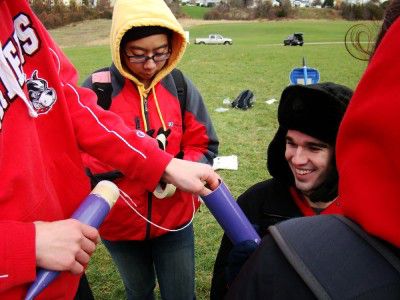
Boston University Rocket Propulsion Group director Armor Harris said he and his group’s members hope to build on research done at BU to successfully launch a rocket into outer space by 2015.
“We’re developing an intense rocket engine, called a hybrid rocket engine, and our goal is to launch it into space in 2015,” Harris, a College of Engineering sophomore, said. “Since 2003, BU has been conducting research into this new propulsion field. This year, we’ve taken all that research … and transformed it into a rocket that’s actually able to fly.”
Harris said BURPG is currently building and testing a model of the 35-foot rocket they plan to launch into space in two years. The model rocket is approximately 17 feet long and weighs around 150 pounds.
BURPG members plan to test the rocket in early August in Nevada, where they will launch it to an altitude of 50,000 feet, Harris said.
March 30, the team will test fire the rocket on the ground at their site in Sudbury to ensure it is functioning correctly, Harris said.
“You could consider that the next big milestone in the project — to demonstrate that the engine operates properly on the ground,” he said. “We basically have this big structure that holds it down on the ground and we fire it statically.”
The student group consists of about 40 undergraduate students, only three of whom are upperclassmen, Harris said. Funding for BURPG comes from ENG as well as from outside corporate sources, including National Instruments and General Electric Aviation.
Harris said hybrid technology originated during the 1940s, but is not yet widely used to make rockets. Hybrid rockets are safer than current rockets, and because BURPG’s runs off of laughing gas and tire rubber, they are more energy efficient.
“[Hybrid technology] has been demonstrated before and it’s been researched before, but we’re really the ones who are putting it together into an operational system,” Harris said.
BURPG members have already begun drafting preliminary designs phase for a larger, 700-pound version of the hybrid rocket, which they hope will make it to space in the summer of 2015, Harris said.
He said BURPG members are also developing training programs for students in the group, including certification that enables students to legally launch rockets.
“It’s what’s celled the Level 1 Certification through the National Association of Rocketry,” said BURPG Vice Director Drew Kelley. “The basic requirements for certification are to successfully launch and recover a small, high-powered rocket.”
Kelley, an ENG junior, said BURPG hopes to have many of its members certified by mid-April. By the 2015 launch, at least one member will need a Level 3 Certification in order to launch the rocket into space.
BURPG is one of the only engineering student groups on campus to offer hands-on activities to students, Kelley said.
“It’s been very eye-opening to the possibilities, as well as a whole lot of fun,” he said.
BURPG Faculty Advisor Caleb Farny said many other engineering student groups at BU are society-oriented, but do not allow students to apply what they have learned in class in the way BURPG does.
Farny, a mechanical engineering professor, said BURPG is different in the 2012-13 academic year in that it now involves more underclassman and students from engineering areas other than mechanical engineering.
“It takes more than one kind of a person to pull something off,” he said. “One thing that’s unique to me about [BURPG members] is that they’re one of the few groups that are able to take what they learn in class — and this is anywhere between freshman and senior year — and they are actually able to apply it to some other different type of project.”
Harris said BURPG is an opportunity for engineering students, as well as students from other schools, to get involved and get experience early in their college careers.
“A lot of freshmen come into engineering thinking they have four years of classes before they can even begin to do anything, but the vast majority of all this is being done by freshmen and sophomores,” he said. “What it’s really about is changing perceptions on what students can do and what students can obtain.”




















































































































